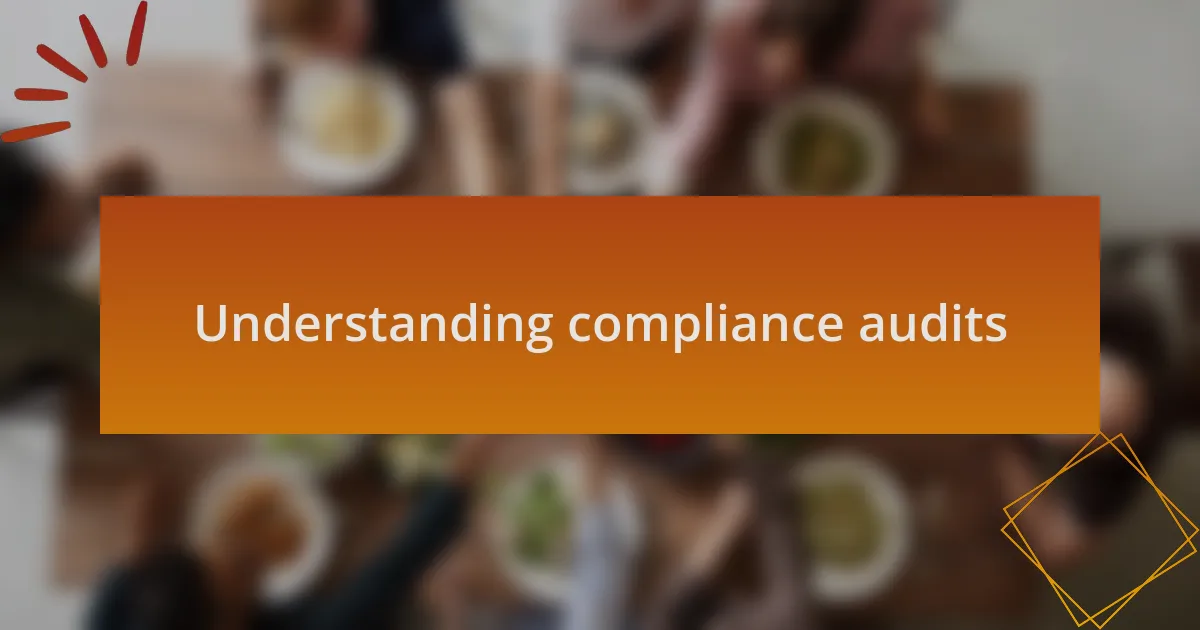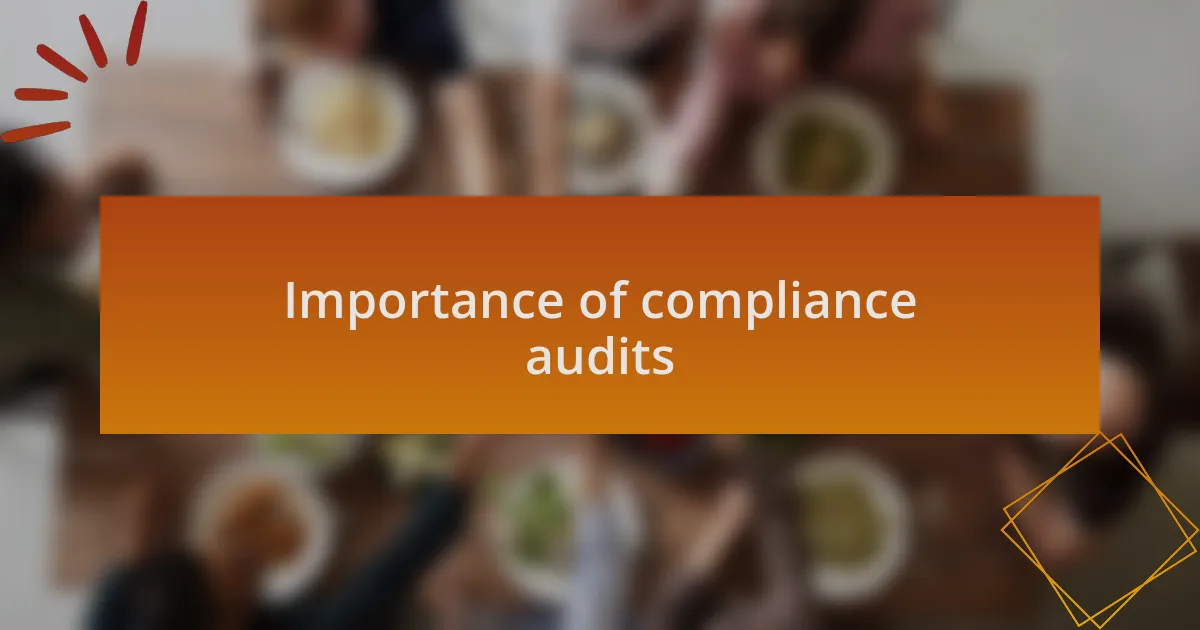Key takeaways:
- Compliance audits provide opportunities for growth by prompting businesses to reevaluate practices and embrace best standards, ultimately enhancing product quality.
- Robust documentation and preparation are essential for ensuring compliance, as missing details can lead to serious consequences.
- Engaging the entire team and fostering a positive mindset transforms the audit process into a collaborative goal rather than a daunting task.
- Maintaining open communication with regulatory bodies builds rapport and simplifies navigating complex compliance requirements.

Understanding compliance audits
Compliance audits are essential in ensuring that cannabis edibles producers adhere to the myriad of regulations governing our industry. I remember my first encounter with an audit; the tension in the air was palpable, and I questioned whether we had everything in order. Reflecting on that experience, I realized that these audits not only help maintain standards but also highlight areas for improvement within our processes.
One of the most significant aspects of compliance audits is the structured review of safety protocols and product quality. During one audit, the inspector pointed out a minor labeling issue that I had overlooked. At that moment, I understood that even small details matter profoundly in maintaining consumer trust and avoiding hefty fines. Isn’t it fascinating how one oversight can ripple throughout the entire business?
While some may view audits as a daunting requirement, I have come to appreciate them as an opportunity for growth. They compel us to reevaluate our practices and embrace best standards, ultimately leading to better products for our customers. Have you ever thought about how much a compliance audit can reveal about your operations? Through my journey, I’ve found that these experiences drive not only accountability but also innovation in the cannabis edibles space.

Importance of compliance audits
Ensuring adherence to regulations through compliance audits is crucial for the integrity of cannabis edibles production. I remember a time when I was anxious before an audit, thinking about all the potential pitfalls. That day taught me the importance of having robust systems in place; it turns out that knowing you’re compliant not only alleviates stress but fosters confidence in your business operations.
I can vividly recall the surprise inspection we faced last year. The auditor unearthed some discrepancies in our ingredient sourcing. At first, I felt defensive, but then it hit me—this was a chance to refine our supply chain. The feedback we received led to enhanced relationships with our suppliers and a more transparent process. Have you ever wondered how a simple audit could open doors to better business practices?
Ultimately, compliance audits serve as a guiding light in a rapidly evolving industry. I’ve seen how they’ve prompted us to adopt new technologies and enhance quality control measures, which has directly improved our product offerings. It’s empowering to think that such evaluations can propel us toward excellence. Have you considered how these audits could spark innovation in your own operations?

Overview of cannabis edibles regulations
Understanding cannabis edibles regulations is essential for anyone involved in the industry. For me, navigating these regulations has been like walking through a maze, with state and federal laws often contradicting one another. I remember feeling overwhelmed the first time I pored over the rules regarding ingredient limits and labeling requirements. It made me realize how important it is to stay updated on changes, as just one oversight can lead to significant penalties.
The regulations governing cannabis edibles often focus on aspects like dosage, THC limits, and safety standards. I remember attending a workshop where experts shared their insights on how variation in regulations across states can impact a company’s market reach. This session was eye-opening, as it underscored the need for a solid compliance strategy tailored to each locale. Have you ever felt the weight of responsibility in ensuring your products meet these diverse standards?
Labeling is another critical component of compliance. When I first learned about the intricacies of accurate and informative labeling, it was a revelation. Not only do labels communicate essential information, but they also build trust with consumers who want to know exactly what they’re consuming. I found it particularly challenging to balance compliance with creativity in our branding, yet I’ve come to appreciate that clear, compliant labels not only satisfy regulations but enhance customer loyalty. Isn’t it fascinating how compliance can actually benefit branding efforts?

Common challenges in compliance
One of the most frustrating challenges I faced during compliance audits was keeping track of ingredient sourcing. I vividly recall a time when I discovered that a supplier’s ingredient didn’t meet the required safety standards, which forced me to scramble for alternatives just days before a product launch. Have you ever experienced that rush of anxiety when you realize compliance risks could derail months of hard work? It’s a reminder that vigilance in sourcing is not just an operational step, but a critical part of our responsibility to consumers.
Another hurdle can be the discrepancy between state regulations and the overarching federal guidelines. I remember the confusion I felt when updates to state laws came through, seemingly at odds with what I understood from the federal standpoint. This constant shifting landscape can leave one questioning, “Am I really compliant?” It’s a balancing act that requires not just knowledge but also the ability to adapt quickly, reinforcing the need for continual education and communication within teams.
Then, there’s the people aspect of compliance. While rules and regulations are about systems and processes, I often found that skepticism from employees about compliance measures could slow things down. I think back to a team meeting where I had to convince my colleagues that meticulous record-keeping wasn’t just bureaucratic red tape—it was vital for the business’s survival and reputation. Engaging the team in understanding the ‘why’ behind compliance can turn what often feels like a burden into a shared mission for our success. Have you ever tried motivating a team around compliance? The results can be transformative.

My personal audit experience
Navigating through my compliance audit experience felt like walking a tightrope. I not only needed to ensure every product met standards but also had to reassure my team as we faced mounting pressure. I’ll never forget the moment I received a call indicating a random audit was happening in just two days. The adrenaline kicked in; it was a scramble to double-check everything, ensuring no corner was cut. Have you ever found yourself racing against the clock, knowing that every detail matters?
One time, I discovered a small error in labeling that could have resulted in a significant compliance issue. My heart sank; I could easily picture the potential fallout—everything from legal repercussions to brand damage. I took a deep breath and dove into a proactive solution, gathering the team for an all-hands-on-deck review session. It was a pivotal moment, teaching us the importance of transparency and teamwork during high-pressure situations. Have you experienced that revelation when a crisis becomes a chance for growth?
The emotional weight of compliance audits often goes underestimated. I remember feeling an intense mix of relief and apprehension as we wrapped up our last audit, realizing that we had passed with flying colors. However, part of me wondered, “What did we miss?” This constant quest for improvement keeps me on my toes, pushing me to view compliance as an evolving journey rather than a final destination. How do you embrace the challenges that come with compliance in your own operations?

Lessons learned from my audits
During my audits, I learned that preparation is key. I vividly remember a late-night session where I meticulously reviewed our inventory records. Missing even one product fact can have serious consequences. This experience instilled in me a new understanding: thorough documentation isn’t just paperwork; it’s a lifeline for ensuring compliance. Have you ever realized that what seems tedious may actually hold the framework of your business?
Another lesson came when we faced a non-compliance issue due to a misunderstanding of local regulations. It felt like a punch in the gut, waking me up to the reality that compliance isn’t static. Regulations evolve, and so must we. I initiated regular training sessions afterward, which sparked discussions and brought clarity to our processes. It’s fascinating how a setback can morph into a teachable moment. What strategies do you implement to stay ahead of changing regulations?
Lastly, audits taught me the value of a positive mindset. The adrenaline rush can cloud judgment, making it easy to overlook critical details. I realized during one particularly challenging audit that keeping a calm, focused demeanor not only helped me but also positively influenced my team. They mirrored my energy, fostering an environment where collaboration flourished rather than froze under pressure. Have you found that attitude can change the outcome of challenging situations?

Tips for successful compliance audits
When preparing for a compliance audit, I found that involving the entire team in the process can make a significant difference. Early in my experience, I once underestimated how collective ownership transforms individual accountability. I remember calling a team meeting where we all went through the checklist together, and suddenly everyone grasped the importance of their role in compliance. Isn’t it amazing how collaboration can turn a daunting task into a shared goal?
One technique that proved invaluable was creating a mock audit scenario. I still recall the one we staged before the actual compliance review; it felt like a dress rehearsal. The team uncovered potential issues we hadn’t noticed before, turning the audit preparation from an intimidating ordeal into a vital learning opportunity. Have you considered how such simulations could reshape your team’s perspective on compliance?
Lastly, maintaining open communication with regulatory bodies has helped me navigate complex requirements. There was a time when I engaged directly with an inspector during a site visit. This not only clarified expectations but also built a rapport that made future interactions smoother. Isn’t it worth considering how fostering relationships can simplify what often feels like a rigid process?